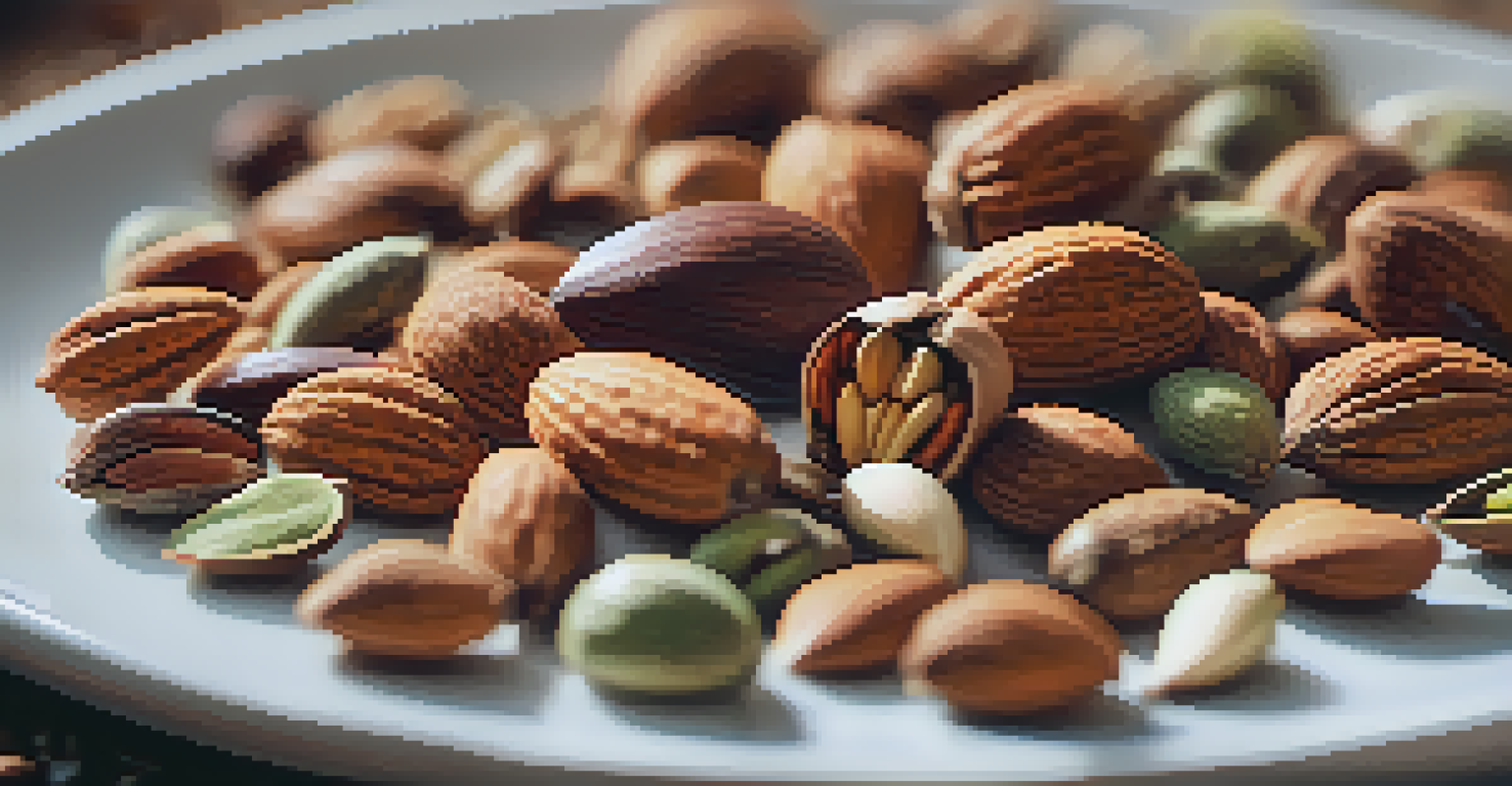Understanding the Nutritional Needs of Vegetarians

The Importance of a Balanced Vegetarian Diet
A balanced vegetarian diet is essential for maintaining overall health. By focusing on a variety of plant-based foods, vegetarians can obtain the nutrients needed for energy and vitality. However, without careful planning, they may miss out on essential vitamins and minerals vital for bodily functions.
Let food be thy medicine and medicine be thy food.
Incorporating a mix of fruits, vegetables, whole grains, legumes, nuts, and seeds can help meet nutritional needs. Each food group offers unique benefits, contributing to a well-rounded diet. This variety not only supports physical health but also enhances mental well-being.
Ultimately, understanding how to balance these food groups is crucial. It ensures that vegetarians receive adequate protein, fiber, and essential nutrients, paving the way for a fulfilling dietary lifestyle.
Key Nutrients for Vegetarians to Consider
Certain nutrients require special attention in a vegetarian diet, such as protein, iron, calcium, and vitamin B12. While vegetables and grains provide protein, combining different sources can enhance intake. For instance, pairing legumes with whole grains can create a complete protein profile.

Iron is another nutrient that vegetarians should monitor closely, as plant-based sources often contain non-heme iron, which is not as easily absorbed by the body. Including vitamin C-rich foods with iron sources can enhance absorption, making it easier to meet daily needs.
Balanced Diet Ensures Nutritional Needs
A balanced vegetarian diet incorporates a variety of plant-based foods to meet essential nutrient requirements for overall health.
Calcium and vitamin B12 are also critical for bone health and nerve function, respectively. Leafy greens, fortified plant milks, and nutritional yeast can help vegetarians obtain these nutrients effectively.
The Role of Protein in a Vegetarian Diet
Protein is vital for building and repairing tissues, and it's a common concern for those adopting a vegetarian lifestyle. While meat is a well-known protein source, many plant-based foods can provide ample protein as well. Beans, lentils, tofu, and quinoa are excellent examples that can easily fit into daily meals.
You are what you eat, so don't be fast, cheap, easy, or fake.
It's important to consume a variety of protein sources to ensure a complete amino acid profile. Mixing different protein-rich foods, such as rice and beans, can help achieve this goal. This approach not only enhances the nutritional value but also adds flavor and diversity to meals.
For those who are active, incorporating protein-rich snacks like nuts or Greek yogurt can be beneficial. This way, vegetarians can meet their protein needs while enjoying tasty options throughout the day.
Managing Iron Intake: Tips for Vegetarians
Iron is a crucial mineral, and its importance cannot be overstated, especially for vegetarians. While red meat is often the go-to source, there are plenty of plant-based alternatives available. Foods like lentils, chickpeas, and fortified cereals can help meet daily iron requirements.
To maximize iron absorption, consider combining these foods with vitamin C-rich options like citrus fruits or bell peppers. This combination can significantly increase the body's ability to absorb non-heme iron from plant sources.
Key Nutrients Demand Special Attention
Vegetarians should focus on key nutrients like protein, iron, calcium, and vitamin B12 to maintain optimal health and prevent deficiencies.
It's also wise to be aware of factors that can inhibit iron absorption, such as calcium and tannins found in tea and coffee. Timing your meals and snacks can make a difference, allowing for better iron intake when consuming plant-based foods.
Calcium Sources for a Healthy Vegetarian Diet
Calcium is essential for strong bones and teeth, making it a critical nutrient for everyone, including vegetarians. Dairy products are well-known sources, but there are plenty of plant-based alternatives that can provide adequate calcium. Leafy greens, almonds, and fortified plant milks are excellent options to consider.
Incorporating a variety of calcium-rich foods into your diet can help ensure you meet your daily needs. For example, incorporating kale into salads or smoothies can significantly boost calcium intake without compromising taste.
It's also important to note that vitamin D plays a role in calcium absorption, so consider getting some sun or looking for fortified foods that include vitamin D. This combination can help maintain healthy bones and overall well-being.
Vitamin B12: A Key Consideration for Vegetarians
Vitamin B12 is essential for nerve function and the production of red blood cells, and it is primarily found in animal products. This makes it a crucial nutrient for vegetarians to monitor closely. While some fortified foods may contain B12, many vegetarians may need to consider supplementation to ensure adequate intake.
Fortified plant milks, breakfast cereals, and nutritional yeast can be good sources of B12. It's important to read labels carefully to confirm the presence of this vital vitamin. Regularly including these fortified foods can help maintain healthy B12 levels.
Meal Planning Enhances Dietary Enjoyment
Creating a well-rounded vegetarian meal plan can make the dietary journey enjoyable and ensure a diverse intake of nutrients.
For those unsure about their B12 status, blood tests can provide clarity. Consulting with a healthcare professional can also provide personalized guidance on maintaining optimal levels of this important nutrient.
Building a Well-Rounded Vegetarian Meal Plan
Creating a balanced vegetarian meal plan can be a fun and rewarding process. Start by including a variety of food groups to ensure you’re getting all the necessary nutrients. Think of meals that incorporate grains, proteins, healthy fats, and plenty of colorful fruits and vegetables.
Planning meals ahead of time can help avoid common pitfalls, such as falling back on processed foods or lacking variety. Experimenting with different recipes can also keep things exciting and encourage trying new flavors and textures.

Don’t forget to listen to your body’s hunger cues and adjust portions accordingly. A well-rounded meal plan will not only nourish your body but also satisfy your taste buds, making the vegetarian journey enjoyable.